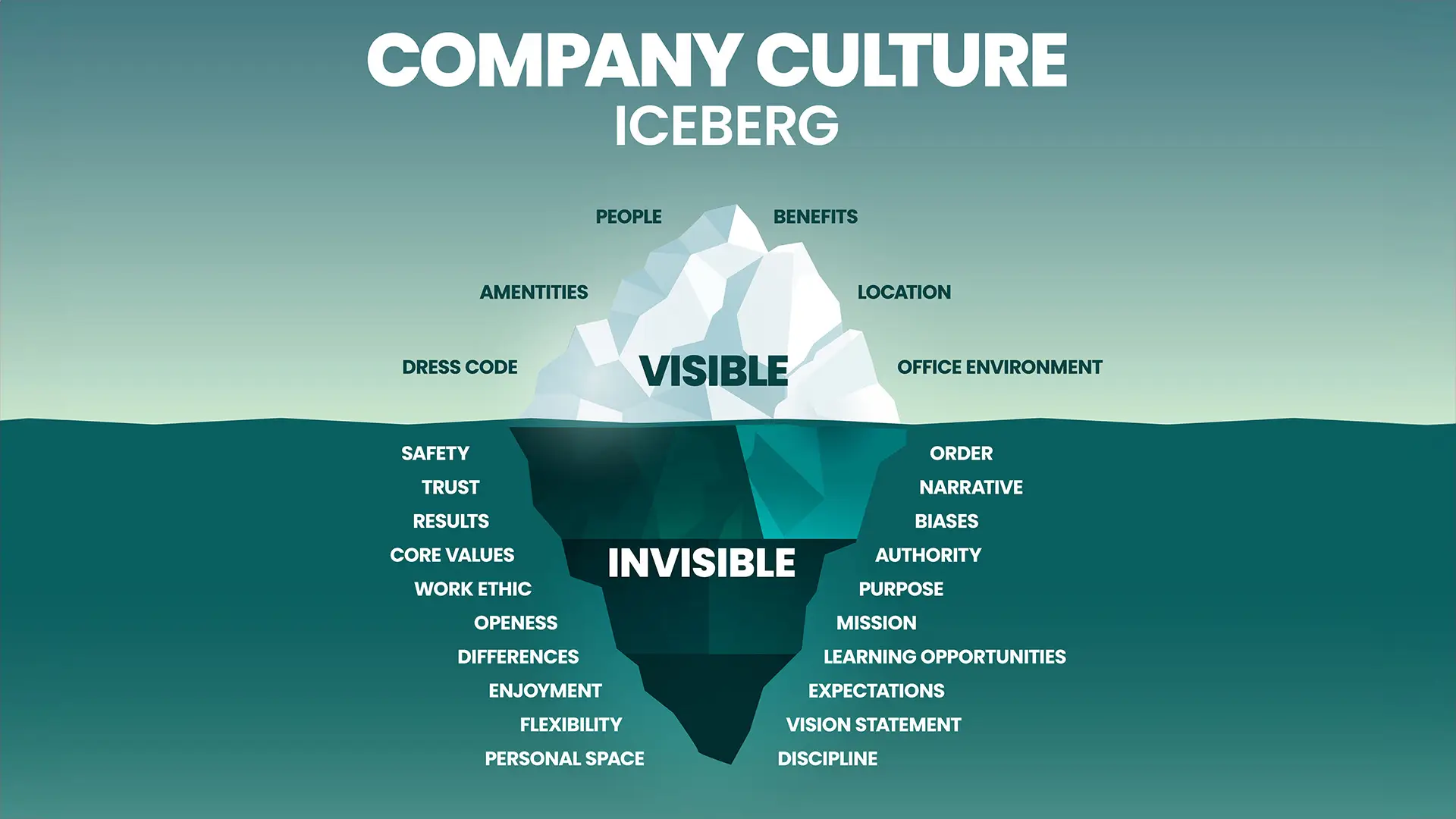Advancing in your career is a journey that goes beyond mastering your job responsibilities. It involves navigating the intricate landscape of the workplace, building meaningful relationships, and making strategic decisions that align with your professional goals. One crucial aspect that often gets overlooked is the understanding of organisational culture.
Organisational culture shapes the experiences, behaviours, and opportunities within your workplace. By gaining insight into this underlying framework, you can position yourself more effectively, embrace opportunities for growth, and accelerate your career progression. This article delves into what organisational culture is, why it matters, and how understanding it can empower you to achieve your career aspirations.
What Is Organisational Culture?
Organisational culture refers to the shared values, beliefs, practices, and norms that characterise an organisation. It’s the essence of “how things are done around here.” Culture influences everything from how decisions are made and how employees interact, to the organisation’s approach to solving problems and responding to change.
Key elements of organisational culture include:
- Core Values: Fundamental beliefs that guide behaviour and decision-making.
- Norms and Practices: Unwritten rules about how employees are expected to behave.
- Symbols and Language: Company logos, slogans, jargon, and stories that convey meaning.
- Environment: The physical and social atmosphere of the workplace.
- Rituals and Celebrations: Regular events or traditions that reinforce the culture.
Understanding these elements helps you navigate your workplace more effectively, aligning your actions with the organisation’s ethos.
Why Understanding Organisational Culture Matters
Enhances Workplace Integration
Aligning with your organisation’s culture can make you feel more connected and engaged at work. When you understand and embrace the culture:
- Easier Collaboration: You communicate more effectively with colleagues who share the same values and norms.
- Increased Job Satisfaction: Feeling like you belong boosts morale and motivation.
- Smooth Onboarding: For new roles or companies, understanding culture accelerates your integration.
Example: If your company values open communication and innovation, freely sharing your ideas not only aligns with the culture but also positions you as an engaged team member.
Guides Career Decisions
Understanding organisational culture can inform your career choices, both within your current company and when considering new opportunities.
- Cultural Fit Assessment: Evaluate whether a company’s culture aligns with your personal values and work style.
- Role Selection: Choose positions or departments where the culture supports your professional growth.
- Long-Term Satisfaction: Working in a culture that resonates with you contributes to long-term career fulfillment.
Example: If you thrive in collaborative environments, joining a team known for individual competition may not be conducive to your success.
Enhances Performance and Recognition
When your behaviours align with cultural expectations, you are more likely to meet performance standards and be recognised for your contributions.
- Meeting Expectations: Understanding unwritten rules helps you avoid missteps.
- Exceeding Standards: Aligning with core values can amplify your impact.
- Visibility and Advancement: Being culturally attuned can increase your chances of promotions and leadership opportunities.
Example: In a culture that values customer-centricity, going the extra mile for clients can lead to recognition and advancement.
Aids in Navigating Organisational Change
Organisations evolve, and understanding the culture helps you adapt to changes more effectively.
- Anticipate Reactions: Predict how changes may be received based on cultural tendencies.
- Influence Outcomes: Leverage cultural insights to contribute positively during transitions.
- Resilience: Adapt to new circumstances with a grounded understanding of underlying values.
Example: During a merger, knowing that your company’s culture emphasises teamwork can guide you in fostering unity between merging teams.
Supports Building Strong Relationships
Cultural awareness enhances your ability to build and maintain professional relationships.
- Effective Communication: Use language and styles that resonate within the cultural context.
- Trust Building: Shared understanding fosters trust among colleagues and leaders.
- Networking: Connect with individuals across the organisation by appreciating cultural nuances.
Example: Participating in company traditions or social events can strengthen your network and sense of community.
Applying Cultural Understanding to Advance Your Career
Conduct a Cultural Assessment
Begin by observing and analysing your organisation’s culture:
- Identify Core Values: Review mission statements, observe behaviours, and listen to leadership messages.
- Observe Norms: Pay attention to dress codes, work hours, communication styles, and decision-making processes.
- Engage with Colleagues: Ask trusted coworkers about their perspectives on the culture.
Reflect on Alignment
Consider how your own values, behaviours, and goals align with the organisational culture:
- Self-Assessment: Identify your core values and preferred work styles.
- Find Common Ground: Look for areas where you naturally align with the culture.
- Identify Gaps: Recognise areas where there may be a disconnect and consider how to bridge them.
Adapt and Contribute
Leverage your understanding to adapt your approach and contribute meaningfully:
- Align Actions with Values: Demonstrate behaviours that reflect the organisation’s core principles.
- Innovate Within the Culture: Propose ideas and solutions that resonate with cultural priorities.
- Be Authentic: Adapt without compromising your integrity or authenticity.
Communicate Effectively
Tailor your communication to align with cultural expectations:
- Use Appropriate Channels: Whether it’s formal reports or casual conversations, use the preferred methods.
- Adopt Common Language: Incorporate organisational jargon or key phrases that convey understanding.
- Be Mindful of Tone: Adjust formality and tone to match cultural norms.
Seek Opportunities
Identify and pursue opportunities that are valued within the culture:
- Volunteer for High-Visibility Projects: Engage in initiatives that align with strategic goals.
- Develop In-Demand Skills: Focus on skills and competencies that are prised in the culture.
- Express Interest in Growth: Let leaders know you’re eager to grow in ways that support the organisation’s direction.
- Build Strategic Relationships
Cultivate connections that support your career advancement:
- Find Mentors: Seek guidance from those who exemplify the culture and have achieved success.
- Collaborate Cross-Functionally: Work with teams across the organisation to broaden your impact.
- Engage in Networks: Participate in employee resource groups or communities that reflect your interests.
Overcoming Cultural Challenges
Sometimes, you may encounter aspects of the culture that present challenges:
- Cultural Misalignment: If values differ significantly, consider whether adaptation or change is viable.
- Navigating Subcultures: Larger organisations may have differing cultures in various departments.
- Addressing Negative Aspects: If you observe toxic behaviours, consider how to address them constructively.
Strategies:
- Open Dialogue: Engage in conversations with managers or HR about cultural concerns.
- Lead by Example: Model positive behaviours to influence those around you.
- Continual Learning: Stay adaptable and open to cultural evolution.
Conclusion
Understanding organisational culture is a powerful tool in advancing your career. It enables you to navigate the workplace with greater confidence, build stronger relationships, and align your efforts with organisational priorities. By actively engaging with and contributing to your organisation’s culture, you position yourself not just as an employee, but as a valued member who embodies the company’s mission and values.
Embrace the opportunity to explore and understand the culture within your workplace. This insight not only enriches your daily experiences but also paves the way for professional growth and fulfillment. Remember, your career journey is deeply intertwined with the environment in which you work. By mastering the dynamics of organisational culture, you unlock new avenues for success and advancement.
Take Action Today
- Observe and Learn: Start paying closer attention to the cultural cues in your organisation.
- Engage in Conversations: Talk to colleagues about their perceptions of the company culture.
- Reflect and Align: Consider how you can better align your actions with the organisational culture.
- Seek Support: If needed, find mentors or professional networks that can offer guidance.
- Invest in Growth: Continuously develop skills and behaviours that are valued within the culture.
Your proactive approach to understanding and embracing organisational culture can make a significant difference in your career trajectory. Take the first step today and watch how it transforms your professional journey.
Feeling out of sync with your organisation's culture?
Have you experienced the impact of organisational culture on your career?
Share your stories or insights in the comments section. Let’s learn from each other’s experiences!
Check out these blog articles from our Career Decisions category!





